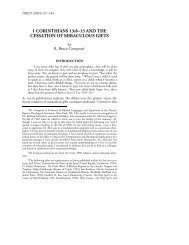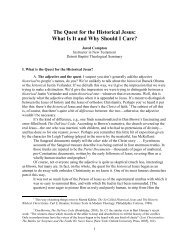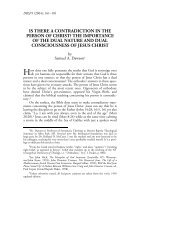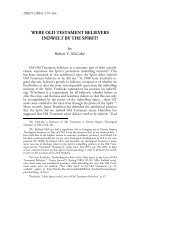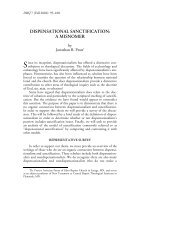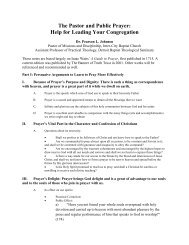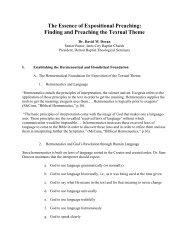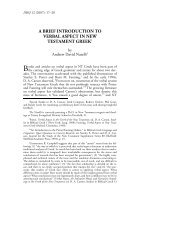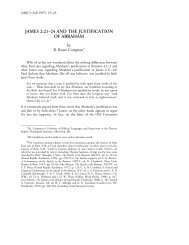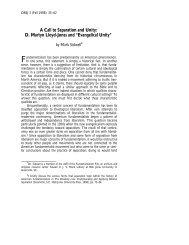Combs, Role of Women in the Church - Detroit Baptist Theological ...
Combs, Role of Women in the Church - Detroit Baptist Theological ...
Combs, Role of Women in the Church - Detroit Baptist Theological ...
Create successful ePaper yourself
Turn your PDF publications into a flip-book with our unique Google optimized e-Paper software.
7entitled Recover<strong>in</strong>g Biblical Manhood and Womanhood. 38 The book was published byCrossway Books, which has been an ally for <strong>the</strong> complementarian cause ever s<strong>in</strong>ce, evenas most o<strong>the</strong>r evangelical publishers have drifted <strong>in</strong>to <strong>the</strong> egalitarian camp.E. In his 1985 article Grudem challenged <strong>the</strong> position <strong>of</strong> Bedale, <strong>the</strong> Mickelsens, and o<strong>the</strong>regalitarian writers. He notes that Bedale himself never cites any ancient Greek sourceoutside <strong>the</strong> Bible to prove his position that kephalē means “source.” Grudem did anextensive search <strong>of</strong> nearly all Greek literature us<strong>in</strong>g a computer database (ThesaurusL<strong>in</strong>guae Graecae) and analyzed 2,336 <strong>in</strong>stances <strong>of</strong> kephalē from <strong>the</strong> eight century B.C.to <strong>the</strong> fourth century A.D. As might be expected kephalē is most commonly used <strong>in</strong>Greek literature <strong>in</strong> a literal sense to designate <strong>the</strong> physical head <strong>of</strong> a person or animal,but Grudem found thirty-two examples outside <strong>of</strong> <strong>the</strong> New Testament itself <strong>of</strong> kephalēused <strong>in</strong> a figurative or metaphorical sense to mean “authority over” or ruler. 39 Forexample, Judges 10:18: “And <strong>the</strong> people, <strong>the</strong> leaders <strong>of</strong> Gilead, said to one ano<strong>the</strong>r,‘Who is <strong>the</strong> man that will beg<strong>in</strong> to fight aga<strong>in</strong>st <strong>the</strong> Ammonites? He shall be head overall <strong>the</strong> <strong>in</strong>habitants <strong>of</strong> Gilead.’” 40 Aga<strong>in</strong>, <strong>in</strong> 2 K<strong>in</strong>gs (2 Samuel) 22:44: David says to God,“You shall keep me as <strong>the</strong> head <strong>of</strong> <strong>the</strong> Gentiles: a people which I knew not served me.”David is called <strong>the</strong> head or ruler <strong>of</strong> <strong>the</strong> people he conquered. In <strong>the</strong> New Testament itwould seem to be beyond debate that kephalē means “authority over” <strong>in</strong> a text likeEphesians 1:22: “And He put all th<strong>in</strong>gs <strong>in</strong> subjection under His feet, and gave Him ashead over all th<strong>in</strong>gs to <strong>the</strong> church”; and Colossians 2:10: “And <strong>in</strong> Him you have beenmade complete, and He is <strong>the</strong> head over all rule and authority.” Bedale also argues that<strong>the</strong> ancients had no concept <strong>of</strong> <strong>the</strong> head controll<strong>in</strong>g <strong>the</strong> physical body so that <strong>the</strong> idea <strong>of</strong><strong>the</strong> Christ <strong>the</strong> head <strong>of</strong> <strong>the</strong> church rul<strong>in</strong>g his body is impossible <strong>in</strong> a text like Ephesians4:15. But Grudem demonstrates with quotes from Plato, Plutarch, and Philo, that ancientwriters did it fact employ such a concept. 41 F<strong>in</strong>ally, Grudem shows that Bedale’sargument that both kephalē and archē (ἀρχή) are used to translate rō’š <strong>in</strong> <strong>the</strong>Septuag<strong>in</strong>t proves noth<strong>in</strong>g s<strong>in</strong>ce Bedale never gives one example where ei<strong>the</strong>r kephalēor archē mean “source” <strong>in</strong> <strong>the</strong> Septuag<strong>in</strong>t. 42 In his own study <strong>of</strong> 2,336 uses <strong>of</strong> kephalē,Grudem f<strong>in</strong>ds, contrary to Bedale, no clear <strong>in</strong>stance <strong>of</strong> <strong>the</strong> mean<strong>in</strong>g “source.” 43F. In 1989 Joseph Fitzmyer, apparently without any knowledge <strong>of</strong> Grudem’s earlier article,also challenges <strong>the</strong> idea that kephalē could mean “source.” 44 He comes to <strong>the</strong> sameconclusion as Grudem. But it was Gudem’s 1985 article that attracted <strong>the</strong> most attention.Numerous <strong>in</strong>dividuals attacked Grudem’s conclusions and defended <strong>the</strong> mean<strong>in</strong>g <strong>of</strong>38 Ibid., p. 15. Available as a pdf at http://www.cbmw.org/images/onl<strong>in</strong>ebooks/biblicalfoundations.pdf.39 “Does Kephalē Mean ‘Source’ or ‘Authority Over’?” pp. 41, 54–56.40 This is <strong>the</strong> read<strong>in</strong>g <strong>of</strong> Alexandr<strong>in</strong>us.41 Ibid., p. 42.42 Ibid., p. 43.43 Ibid., p. 52.44 Joseph A. Fitzmyer, “Ano<strong>the</strong>r Look at ΚΕΦΑΛΗ <strong>in</strong> 1 Cor<strong>in</strong>thians 11:3,” New Testament Studies 35(October 1989): 503–11. Fitzmyer wrote a follow-up article <strong>in</strong> which he suggests that kephalē can mean “source,”though “authority over” is more common and that “authority over” is without question <strong>the</strong> correct understand<strong>in</strong>g <strong>in</strong>1 Cor 11:3 (“Kephalē <strong>in</strong> 1 Cor<strong>in</strong>thians 11:3,” Interpretation 47 [January 1993]: 52–59).



